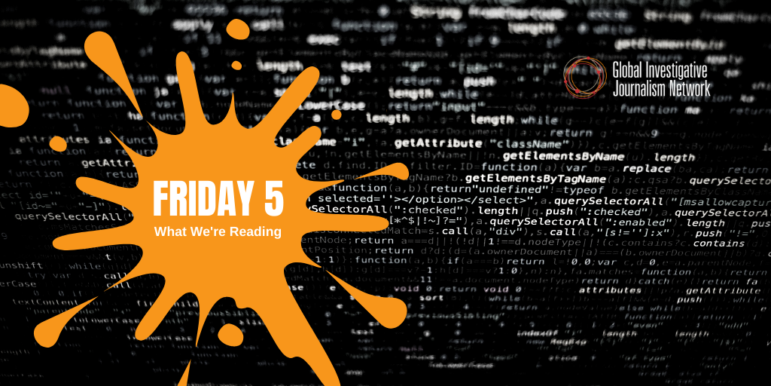

What We’re Reading: Facebook’s Original Reporting Algorithm, Academic and Journalism Collaborations, and the Race Problem in Europe’s Newsrooms

This week’s Friday 5, where we round up our favorite reads from around the world in English, includes a recent algorithm change on Facebook’s News Feed that will boost original news stories, lessons learned on an academic and investigative journalism collaboration in Hungary and Romania, and European media’s race problem.
Facebook Changes Algorithm to Boost Original Reporting (Axios)
This week Facebook started using algorithms to update the way English language news stories (with more languages promised “in the future”) are ranked in its News Feed in order to prioritize original reporting. The technology is set to analyze groups of articles on particular story topics and will identify stories “most often cited as the original source.” The new algorithm will also demote stories that don’t carry bylines, or sites that don’t offer up information about editorial staff. That’s something the US-based Trusting News project says is a key transparency element, alongside a publisher showing its mission, where it gets its funding and how a publication reports. To read about the not-so-friendly side of Facebook and the media, check out CJR’s recent Spies, Lies, and Stonewalling: What It’s Like to Report on Facebook, and Julie Possetti’s CNN piece on why Facebook must share blame for the death threats and persecution of journalists like Rappler’s Maria Ressa.
What Happens When Academia and Media Work Together (Medium)
In a collaboration with GIJN members Atlatszo, a Hungarian investigative outlet, and the Balkan Investigative Reporting Network, the Central European University’s Center for Media, Data and Society launched the Black Waters investigative reporting project in April 2019. This story, written by Marius Dragomir and Robert Nemeth, highlights lessons learned from the project, which brought together four journalists, two anthropologists, a sociologist, an audio assistant, and a natural scientist to investigate environmental corruption in Hungary and Romania. You can read more about the process in their report on how investigative journalists and academics can work together. In a similar vein, Anya Schiffrin’s June piece for the Columbia Journalism Review profiled The Conversation, the website where academics write pieces which are edited by teams of journalists around the world.
European Media Has a Racism Problem (IJNet)
On the heels of the Black Lives Matter protests, Hostwriter’s Christina Lee went straight for the jugular. In this piece for IJNet, Lee referenced German broadcaster ARD’s line up of an all-white panel of male experts to discuss racism and police violence, “including a columnist well known for commentary like, ‘Corona-fear: Am I racist if I don’t want to sit next to Chinese people on the subway?'” Lee’s analysis broke down some of the structural racism issues endemic in European media, urging the industry to “consider how institutional racism, in society and in their own newsrooms, has shaped which stories get told, how they are told, and who is trusted to tell them.”
Do Online, Offline, and Multiplatform Journalists Differ in Principles and Practices? (Journalism Studies)
In this report published in the Journalism Studies academic journal, researchers from the UK, Germany, and the Netherlands delved into the “concept of journalism as an ideology comprising four ideal professional values: public service, objectivity, autonomy, and ethics.” Using survey data from the Worlds of Journalism Study, the researchers compared professional principles and practices among online, offline, and multiplatform journalists in nine Western and Eastern European countries. They found, contrary to previous research, that principles and practices among online and offline journalists “broadly conform.” But they also discovered that online journalists are “more likely than their offline colleagues to find justification for publishing unverified information and [are] less interested in holding politicians to account.”
Investigating Infrastructure Links with Passive DNS and Whois Data (Citizen Evidence Lab)
The latest how-to guide from Amnesty International’s Citizen Evidence Lab shows how Domain Name System (DNS), Passive DNS, and Whois data can be used to dig into a website’s infrastructure, techniques that can help when investigating disinformation or malware campaigns — or just to take a look under an organization’s hood. Tracking domains means you can look up IP addresses and figure out the owner of the server, while Whois data can help you track when a domain was created and information about the owner including name, address, phone number, or email address. Another resource worth checking out: NPR’s recent Must-have Math Skills for the Number-crunching Newsperson, an important reminder that even when your story isn’t made of big data, it is often the small numbers that need to be counted — and recounted.
 Tanya Pampalone is GIJN’s managing editor. Prior to GIJN, she was executive editor of Mail & Guardian, managing editor of Maverick (now Daily Maverick), and head of strategic partnerships and audience development for the African arm of The Conversation. Tanya is also co-editor of I Want To Go Home Forever, and a contributor to Southern African Muckraking and Hostwriter’s Unbias the News.
Tanya Pampalone is GIJN’s managing editor. Prior to GIJN, she was executive editor of Mail & Guardian, managing editor of Maverick (now Daily Maverick), and head of strategic partnerships and audience development for the African arm of The Conversation. Tanya is also co-editor of I Want To Go Home Forever, and a contributor to Southern African Muckraking and Hostwriter’s Unbias the News.









